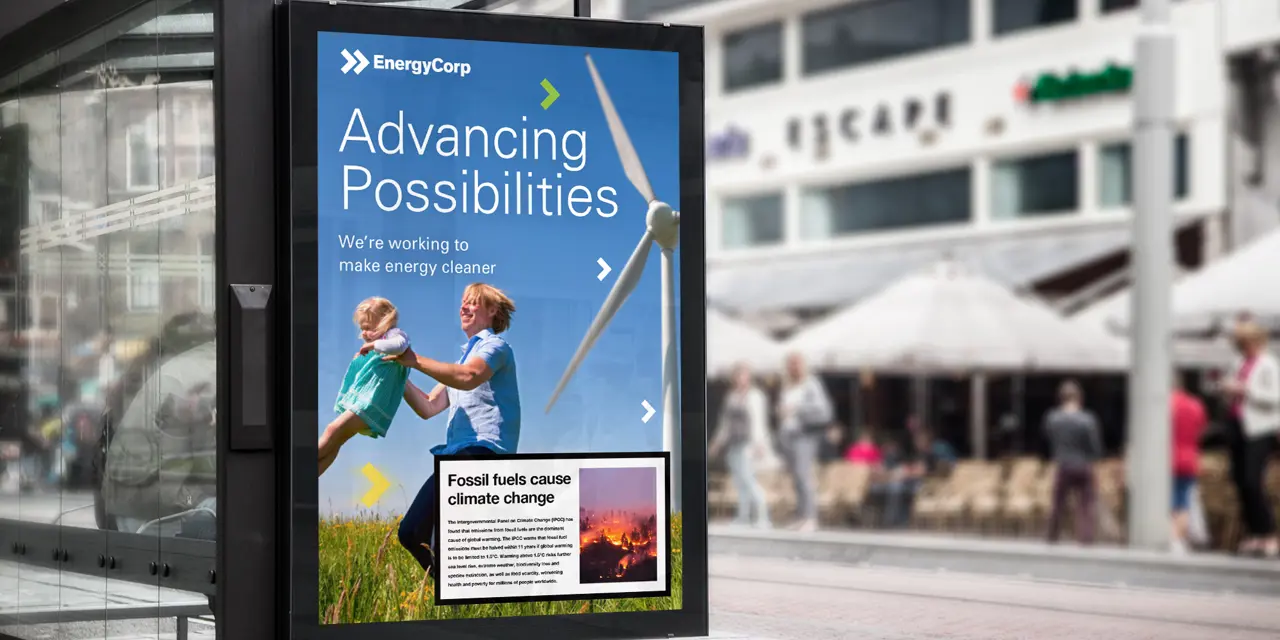ClientEarth Communications
4th November 2020


As ClientEarth’s Climate Accountability Lead, Sophie Marjanac is at the helm of our fight to hold governments and businesses to account when they are not acting in line with laws and regulations. In 2019, she and her team brought a complaint against BP, leading to the fossil fuel giant pulling ad campaigns focusing on its low-carbon energy investments, on the grounds that they were misleading the public about the company’s polluting business model. We sat down with Sophie to talk all things greenwashing, and what she’d like to see from corporate marketing in the future.
“Greenwashing is where a company uses advertising and public messaging to try to appear to be environmentally sustainable and green – greener than it really is. It’s also a technique used by certain companies to distract consumers from the fact that their business model and activities actually do a lot of environmental harm and damage.”
“Companies spend millions on reputational advertising to protect their social license to operate, that is, the ongoing public acceptance of their business practices. They do it to attract customers, and they do it to win over supporters – often in governments – so that they can continue to operate as they wish.
While greenwashing isn’t new, there’s been a huge uptick in interest among consumers recently around environmentally and socially conscious products, and consumers are much more concerned about making environmentally friendly purchasing decisions. So, companies have a real financial incentive to appear sustainable and socially conscious.
There’s also increasing pressure from governments, financial regulators, investors and the public for companies to make environmental commitments around sustainability, climate change and biodiversity. Greenwashing is a way for a company to convince people that it is part of the solution to climate or biodiversity crises. This, in turn, allows it to gain customers, protect its financial interests and, in some cases, actively distract attention away from the negative environmental impacts that its actions are having.”
Consumers are much more concerned about making environmentally friendly purchasing decisions. So, companies have a real financial incentive to appear sustainable and socially conscious.Sophie Marjanac, Climate Accountability, Lead

“I think in the past few years we’ve really seen a huge amount of greenwashing in the oil and gas sector, particularly from gas companies, and that’s not just in the US, but in Europe and Asia as well. The fossil fuel industry has been running a sophisticated and well-documented campaign to slow down climate action for the past 30 years, so they’re certainly very good at it.
The other big area is plastics and packaging. This is because there has recently been a huge amount of consumer concern around the impact of plastic packaging on our planet, and as a result, supermarkets and other fast-goods companies are trying to make their products appear as green as possible.
Many different brands, for all sorts of products, are really latching onto consumer concern about the environment now, and are using more ‘green’ advertising to sell products. That’s not to say that every green claim made by a company is inaccurate or misleading, but there are certainly a lot of claims made that don’t match up with reality.”
“There’s a lot of surprisingly simple ways in which brands engage in greenwashing – the way that they design their packaging for example. If you literally put something in green, more ‘natural looking’ packaging, a certain kind of consumer is more likely to buy it, and you can even charge more for it. Things are often labelled as ‘eco’ or ‘sustainable’ without those terms actually having any real meaning. Although there are guidelines around doing this, they often aren’t adhered to. If you visit any shop now, or look at any billboard, there will always be products trying to cash-in on the green market like this.
A great recent example of blatant greenwashing is Ryanair. They got into trouble earlier this year for saying that they were offering ‘low CO2 flights’, which just isn’t possible. Their advertising was banned by the ASA in February. They called themselves ‘Europe’s lowest emission airline’ and a ‘low CO2 emissions airline’, and the ASA said that these claims were ‘misleading’ and ‘couldn’t be substantiated.’”
“Last year we brought a complaint against BP for its ‘Possibilities Everywhere: Keep Advancing’ advertising campaign. The campaign used some advertising techniques that we often see in the fossil fuels sector. BP emphasised its very small and insignificant renewable energy investments as if they were a far bigger part of its business model than in reality. It also talked about gas as a transition fuel, when in reality it is a fossil fuel that is contributing to climate change, and needs to be phased out of our energy systems in order to meet the 1.5 degrees goal of the Paris Agreement.
My team put together a complaint to the UK National Contact Point for the OECD Guidelines on Multinational Enterprises against BP, claiming that its ads were misleading. The campaign emphasised the company’s low carbon energy products, when in fact 96% of its annual spend is on oil and gas.
I’d say the ‘Possibilities Everywhere’ campaign was a good example of corporate greenwashing. We should, however, give credit to BP for acting in a decisive way to take the ads down, and they’ve now made a commitment not to do any more corporate reputation advertising, and to spend that money on advocating for climate policies instead. It’s a noble ambition, so let’s hope that it is followed through in practice.”

“We believe that all advertising must be properly regulated with strong enforcement of existing laws. We also think that fossil fuel advertising, in particular, must come with a tobacco-style health warning about the dangers of fossil fuels, given that they cause dangerous climate change and global heating.
Such a warning label would help educate the public about climate change generally, and would also shine a spotlight on the particularly egregious behaviour of a sector that has, over the years, slowed down climate action and contributed more than any other industry to the climate crisis that we now face.”